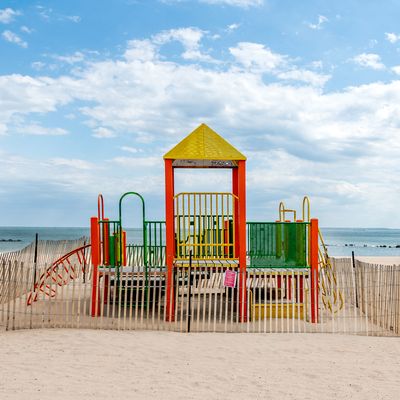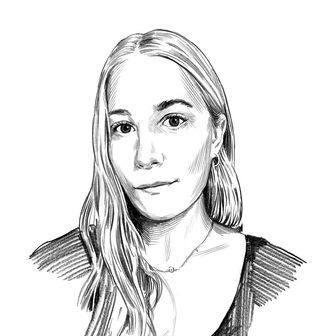
New York’s first truly warm day of the year occurred last weekend, when the temperature crept above 75, what I call anti-clog weather (your feet get too hot). The New York Post reported that people around the city were flouting social-distancing guidelines, gathering outside bars and lounging in groups on the beach. One photo in particular from the report felt particularly outrageous, of three women in tank tops and sports bras, arms draped over each other, masks hanging on their chins, laughing with their plastic cups at a high-top table outside a restaurant.
The image was shocking because it was so normal — boring, even, if not for the pandemic. The behavior of this group of friends laughing together was so cheerfully banal, they almost looked like models in a stock photo. They may have stood closely together for only a moment, but my visceral horror underscored a significant realization: Summer weather is coming, but summer is not.
Summer in New York is more than a season; it brings with it a different mode of being, a certain kind of freedom. A city that, in colder months, can feel closed and claustrophobic, like a stack of shipping containers, mired by commuters and gridlock, suddenly gets twice as big: We can sit outside, walk to work, fill up parks. More literally it is, in that last respect, our freest season financially, when the last vestiges of the city’s admission-free public spaces come to life with outdoor film screenings, parades, and festivals. Summer here is what a lot of us, I think, were holding out for way back in March when our warring governor-and-mayor duo finally told us to stay home. First, the optimistically titled PAUSE order was instituted for two weeks, then extended for two more; then, for a good while in April, it seemed nebulously to have turned into “until summer.”
But still, no one was quite sure. Friends held off canceling weddings and vacations and birthdays. Now, with Memorial Day approaching, things remain as inconclusive as ever. Although seven of New York State’s ten regions have started to slowly reopen, the city remains locked down for the foreseeable future. Summer has functioned, as it always does in New York, like a promise — one that is now broken. On top of that broken promise, two months in, we are beginning to experience “quarantine fatigue,” which, as Julia Marcus recently explained in The Atlantic, has left people all around the country feeling frayed, isolated, and depressed, as deep changes to our daily lives and more uncertainty about the future set in. The loss of summer brings with it a new sort of sadness alongside that weariness.
One thing we can do is mourn it, properly. We can be honest with ourselves that, no matter how stoic we are, missing out on summer is, yes, a sacrifice. But it’s one we have to make: Testing is still not widespread enough in most places, with populations largely still vulnerable to infection, according to studies. There is a very serious risk, if cities open up too quickly, that we will endure a second wave of cases. But even if the curve is indeed flattening, people are out of work, exhausted by homeschooling, racking up debt — there is real suffering and fear here. We can acknowledge that it will be hard, in the midst of all that, to walk on the beach without wading in the water.
We can then, as Marcus also suggests, actually adapt to the awful uncertainty of the pandemic’s end, not with the willful denial of wearing a mask around our chins in a crowded outdoor bar, but with an understanding that our circumstances are fluid. Another image, of Domino Park in Williamsburg stamped with white circles on the grass to indicate appropriate distancing space, seems to embody this more practical, and forgiving, approach to patrolling ourselves. People have different risks to the disease, and the risk is lower out of doors than in, and perhaps most people really do want to do the least harm while enjoying just a sliver of summer. We can be resilient, embracing new inconveniences and changes to routines that really do feel like hardships — and will feel even harder as it gets hotter — while reserving our most caustic judgment for the aspects of city life, like our underfunded health-care system, that really need reform.
All the times I felt overheated and disgusting just a year ago are now painful sources of regret and longing: Why didn’t I realize how lucky I was, to be waiting in a crush to order my drink, in a cloud of dance-floor musk? Why did I complain so much about the train ride to Coney Island? But it’s good to remember that before all this, summer in New York was also about endurance. We stood in the lines and shvitzed in the subway because we were trying to get somewhere exciting. I’m trying to hold on to those things, and think about how we might better protect them, invest in them, for when we can really go out. Just like we will not see a spike in cases for many weeks, if reopening causes more infections, we won’t know what life will be like here if we fight for it. There is always next summer, or the summer after that.


